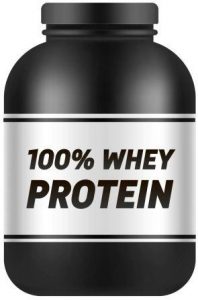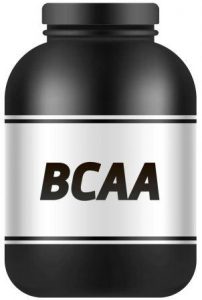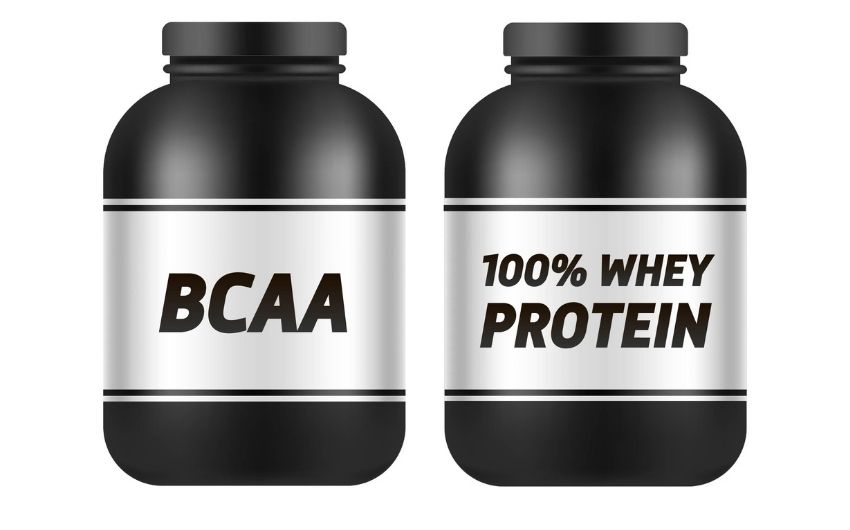Those of you new to bodybuilding, athletics, and supplements may wonder which products they ought to consume and which supplements they should avoid.
It is a common question whether BCAAs or whey protein is better. Many people are not aware of the differences between the two. Where are the differences between the two? Do both need to be taken? Is there a preference between the two?
Due to their ability to enhance muscle building and recovery, BCAAs have made a name for themselves in the fitness industry.
However, protein powders, such as whey powders, are also among the most popular supplements for bodybuilders. Supplements can confuse newcomers to the fitness world, especially when it comes to those who are just getting started.
If you desire to meet your fitness goals, BCAA supplements can sometimes be more helpful than whey protein powders and vice versa.
In this article, we will explore how whey protein and BCAAs affect your workout, how they differ, and which one is ideal for you.
Whey Protein

As they sound, the words are the same. Whey protein is derived from the whey left over after curdling and straining milk. In addition to being a good source of readily digestible protein, it may be added to your diet as an extra protein source if you need more than from vegetarian sources, such as beans, tofu, and milk.
Further, whey protein can help repair the microtears that appear in your muscles after a hard workout. As a result, it can help you recover and keep from experiencing excessive soreness or weakness after a workout.
Whey proteins contain all nine amino acids necessary for the body to function well. It is impossible for the body to produce these amino acids, so they must be obtained from food.
The protein that was once considered a by-product of cheese production, is now used by millions of people around the world every day as a supplement. Whey protein was a huge hit with fitness enthusiasts due to its huge amount of health benefits and its rapid absorption by the body.
If regularly taken before working out, it improves your performance and makes your muscles more energetic.
Researchers in 2017 found that whey protein is digested more quickly than most other proteins. The substance can be used to repair muscle and build fibres that are torn during workouts. In terms of recovery post-workout, these nutrients are thought to be beneficial.
In short: The whey protein found in milk is a source of all 9 amino acids the body requires to function properly. As a high-quality protein and a protein supplement, it makes an excellent choice.
BCAA (Branched Chain Amino Acids)

There are three essential amino acids in BCAAs, which stand for Branched Chain Amino Acids. There are three amino acids: leucine, isoleucine, and valine.
A branching chain of one molecule characterizes its molecular structure. The human body contains about 35-40 per cent BCAAs.
The unique chemical structure of BCAAs makes them easily digestible by the body. Their breakdown occurs in the muscle, not in the liver as it is with other amino acids. Due to their availability and convenience, they can be used immediately during exercise to provide energy.
Due to its high consumption by fitness enthusiasts, it is one of the most popular supplements in the world of supplements. It is easier for BCAAs to be absorbed than other amino acids.
Amino acids of this type increase protein synthesis and boost athletic performance as well as promote lean muscle growth.
Among the three BCAAs, leucine has the largest contribution to muscle growth. Besides helping you manage muscle soreness; they also relieve you from aches and pains after exercising. As a consequence, the amino acids valine and isoleucine can better regulate blood sugar levels and produce energy.
Neither of these compounds can be produced by the body, so they need to be acquired via the diet. Among the many foods that contain BCAAs are meat, poultry, eggs; nuts such as almonds, cashews, and brazil nuts; whole grains, and lentils.
In short: Three amino acids are known as BCAAs—leucine, isoleucine, and valine. Contrary to other amino acids, these provide energy much more quickly since they are assimilated into muscle tissue.
Which is better: BCAAs or Whey Protein
It has been proven that protein supplements are an effective post-workout supplement. The effect is particularly pronounced on whey proteins. There are Branched Chain Amino Acids (BCAAs) in the powder, in addition to all the essential and non-essential amino acids.
As a result, you may be asking yourself – “I already drank a whey protein shake, does taking a BCAA supplement make sense?”?
Let’s look at it!
Effects on Muscle Growth

All essential amino acids are present in whey, including BCAAs. BCAAs account for a significant percentage of whey protein. Whey is a great choice for post-exercise nutrition due to the amino acids it contains.
Activating your protein synthesis is necessary when you want to improve strength or to build muscle. A leucine-rich diet is very important for this purpose.
Muscles are built and repaired through chemical signals in your body. The signal resulting from resistance exercise is amplified by leucine.
However, even though leucine is thought to stimulate muscle building, other amino acids are needed too. While BCAAs are important, whey supplements contain them and much more.
Similarly, whey provides a quicker and more effective recovery rate of muscles growth. Therefore, when whey and BCAAs are compared in terms of their effects on muscle development, the former is much more beneficial than the latter.
In short: A BCAA supplement’s most coveted use is to stimulate protein synthesis, making BCAAs a highly sought-after supplement. Even though whey supplements comprise BCAAs, they still include the crucial amino acids the human body requires.
Fitness benefits
Your exercise routine and your fitness goals play an important role in determining your supplement selection. Whether you’re in a warm or cold climate, your location, your environment, and the weather factor in a lot as well.
If you choose to run in the park or around the block, you will sweat a lot and feel very hot very quickly.It has been proven that BCAA supplements increase endurance in moderately hot temperatures. When you are working out in hot conditions, this becomes even more significant. Especially since you will be outside during these activities, it is excellent for endurance training and marathons.
When you are lifting weights inside a gym, that isn’t very relevant. Whey contains all the fundamental amino acids and is therefore the most dependable choice.
While BCAAs provide you with an instant energy boost and help with muscle repair, whey is a better choice for building muscle and reducing post-workout muscle soreness.
In short: BCAAs are primarily used for building muscle and recovering muscle. Whey provides a more progressive range of workout prospects as well due to its other vital amino acids.
How it impacts weight loss

For many people, losing weight and getting a toned body are the primary goals. Protein shakes made from calorie-rich protein sources, however, defeat this very purpose.
A low-calorie supplement is important for weight loss to avoid wrecking your efforts.The lower calorie content of BCAAs makes them a much more appealing option.
Only 20 calories are in 5 grams of BCAAs, while 100 calories are in 5 grams of whey protein supplement. If you are trying to lose weight and maintain muscle, BCAA is a better choice.
In short: BCAAs are better than whey for boosting protein synthesis during a fasting state since they have fewer calories.
The rapid absorption of nutrients
As BCAAs are readily available when exercising in a fasted state, they are a good alternative to whey protein. It is necessary to break down and metabolize the amino acids in whey, which is not the case with BCAAs.
Their energy will be readily available as they are instantly absorbed by the muscles. In contrast to other amino acids, BCAAs can be broken down in the muscle, whereas others are broken down in the liver.
As BCAAs already break down into the amino acids that the body requires for the reaction to take place, leucine, one of the BCAAs, encourages protein synthesis more than any other usual dietary protein. As a result, proteins are synthesized more quickly.
The body is readily able to access BCAAs during exercise. Due to BCAAs being metabolized directly by muscles, unlike other amino acids, they are instantly absorbed by muscles.
The Cost Factor
Whey protein is significantly cheaper than BCAAs. Whey protein supplements cost between 2,000 and 3,000 rupees per pack, however, BCAA supplements cost between 2,500 and 4,000 rupees per pack.
As such, there is always the option of using whey supplements, which are significantly cheaper than BCAA supplements and provide very similar results.
In short: With Whey supplements you can get more or less the same effects as BCAAs but at a cheaper cost.
Whey Already Has BCAAs
BCAAs comprise approximately 20 percent of whey protein and amount to 5-5.5 grams on average. That should be sufficient for your BCAA requirement.
Whey supplements are always better choices since 5 grams of BCAAs boost muscle synthesis, reduce soreness after a workout, and can help prevent muscle breakdown.
Only when you are taking BCAA for a specific purpose, such as bodybuilding competition preparation, is it relevant to buy BCAA.
In short:Several essential amino acids are seen in whey protein, including BCAAs. Whey would be the more suitable option if you must decide between both.
Dietary Replacement
If you have trouble eating meals, using whey supplements can help you replace them. However, this is not applicable to BCAA supplements.
In short: Complete proteins such as whey contain all essential amino acids, which is not the case with BCAAs. Whey protein has the advantage of being replaceable as a meal substitute, but BCAAs aren’t.
Lactose Intolerance
The selection of a protein powder should be more careful when a person has lactose intolerance. An inability to digest lactose is a cause of lactose intolerance. Lactase digestion is facilitated by an enzyme called lactase. In addition to bloating and abdominal cramps, diarrhoea is a typical sign of lactose intolerance.
The whey proteins in milk are generally used to make protein supplements, but this watery component of milk also contains lactose. Most of this lactose is removed through the ultrafiltration process during the production of whey protein isolates. Lactose-sensitive people, however, may experience some unwanted reactions.
In this case, BCAA is the better choice due to its lactose-free nature. In addition to taking BCAAs, you should eat a well-balanced diet that provides your body with the other necessary amino acids.
In short: In the case of lactose allergy or taste aversions to whey, BCAAs are the better choice as a workout supplement.
Whey Protein and BCAA: Can They Be Taken Together?
It shouldn’t matter what BCAAs and whey are to those who take supplements to enhance their workout at all. They can both complement one another nicely, so they can accompany each other.
They have both been widely used by fitness enthusiasts with excellent results.
Once you finish weightlifting, enjoy a protein shake made with BCAAs added to your pre-workout shake. you can enjoy both with this way.
Finally, let me offer this note:
Whey or BCAAs can be taken depending on the individual’s requirements. You will require different materials based on your fitness management.
If you desire to drop weight while still sustaining your muscle mass, BCAA is the best choice. An intense workout can be supported and proved beneficial by it.
Nevertheless, whey is a complete protein supplement, containing all nine essential amino acids that are required to be obtained from food. In addition, whey also contains BCAAs (leucine, isoleucine, valine).
So, it fulfils your needs in a more superior way, without any extra effort required. For individuals with lactose intolerances or aversions to whey, BCAAs are a better option.


